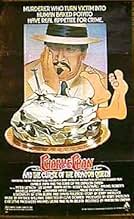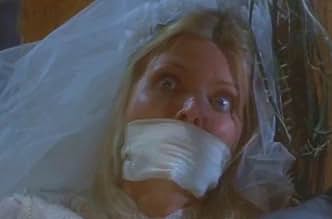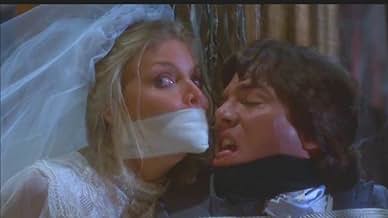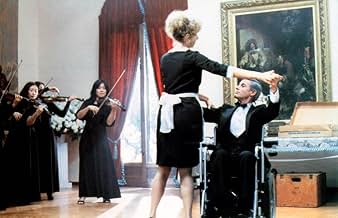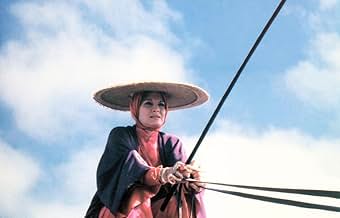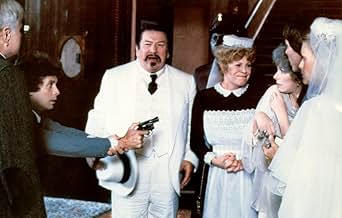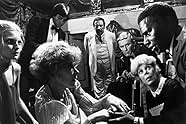La maldición de la Reina Dragón
Título original: Charlie Chan and the Curse of the Dragon Queen
PUNTUACIÓN EN IMDb
4,1/10
1,5 mil
TU PUNTUACIÓN
El detective Charlie Chan ayuda a la policía de San Francisco a resolver los numerosos y extraños asesinatos. Su torpe nieto Lee, que se va a casar, le "ayuda". ¿Está la Reina Dragón detrás ... Leer todoEl detective Charlie Chan ayuda a la policía de San Francisco a resolver los numerosos y extraños asesinatos. Su torpe nieto Lee, que se va a casar, le "ayuda". ¿Está la Reina Dragón detrás de esto?El detective Charlie Chan ayuda a la policía de San Francisco a resolver los numerosos y extraños asesinatos. Su torpe nieto Lee, que se va a casar, le "ayuda". ¿Está la Reina Dragón detrás de esto?
- Premios
- 1 nominación en total
Argumento
¿Sabías que...?
- CuriosidadesIn the Shanghai bar scene, Lee Chan, Jr. (Richard Hatch) orders a "Captain Apollo on the rocks." Captain Apollo was Hatch's character on Galáctica: Estrella de combate (1978).
- Pifias(1:23:58) The text of the newspaper clipping ("Pineapple King In Love Tryst") doesn't reference the case in the slightest.
- Citas
Charlie Chan: Process of aging never agreeable, but better than alternative.
- ConexionesEdited into How American Cinema Changed Hollywood Forever (2003)
- Banda sonoraHappy Birthday to You
Written by Patty S. Hill and Mildred J. Hill
Performed by Michelle Pfeiffer and Richard Hatch
Reseña destacada
This thing is no fun whatever.
Too bad, because it had a lot going for it.
First, there is the Charlie Chan legacy. It was something that walked with the movie-going public during that decade when our current notions of visual narrative evolved. It wasn't particularly influential except for the early notion that our on-screen eye differed from those around him in matters of cognition encoded visually by race. The explicit irony was the Chineseness of the man was deliberately bogus.
Second there's the appearance of Peter Ustinov. For this bit, you have to know the absolute importance of the fictional Hercule Poirot in how film discovery evolved. Ustinov had just played Poirot in the to-then most high budget detective story filmed. So when we see him (or did when this was new) as a similarly portly, pretentious, internally cogitating detective, it matters.
Third, someone involved was intelligent enough to set the thing properly. It begins with a faded black and white "old-style" Chan movie with our modern characters but a couple decades previously. The mystery shown bears on the one in our movie. Later, at the end of our movie, the action takes us to an old moviehouse in Chinatown where a Charlie Chan movie festival is being held. (No mention in our film that Chan has a film persona.) The trademarked end (copied from Poirot) where Chan gathers all the suspects and tells each one why they are the murderer, until revealing the real murderer (after a separately scripted false alarm) this happens in the scenery loft of the theater where a Chan film is playing below.
Naturally the chase to catch the murderer takes each character in front of the giant screen where the audience applauds them.
But its the truest of parodies. Usually parodies put new life into old form by adding a new layer of reference. Its a mistake to think that the "new life" would be funny, or more entertaining in any way. This is true parody: it took something that was dead and added enzymes to the decomposition.
There's one joke I appreciated. The Chan films are generally pretty vile in how they handle race. One trick is to set the bottom racially so that Chan can drift at the top in some cerebral racial advantage. That meant that the black driver was nearly subhuman. Stupid, ignoble.
The driver here is a black man also. Poised, attractive, articulate. We learn some noble things about him at the end.
Oh, another small matter of interest. It has a very young Michelle Pfeiffer, very pretty before she had all that work done on her face.
Ted's Evaluation -- 1 of 3: You can find something better to do with this part of your life.
Too bad, because it had a lot going for it.
First, there is the Charlie Chan legacy. It was something that walked with the movie-going public during that decade when our current notions of visual narrative evolved. It wasn't particularly influential except for the early notion that our on-screen eye differed from those around him in matters of cognition encoded visually by race. The explicit irony was the Chineseness of the man was deliberately bogus.
Second there's the appearance of Peter Ustinov. For this bit, you have to know the absolute importance of the fictional Hercule Poirot in how film discovery evolved. Ustinov had just played Poirot in the to-then most high budget detective story filmed. So when we see him (or did when this was new) as a similarly portly, pretentious, internally cogitating detective, it matters.
Third, someone involved was intelligent enough to set the thing properly. It begins with a faded black and white "old-style" Chan movie with our modern characters but a couple decades previously. The mystery shown bears on the one in our movie. Later, at the end of our movie, the action takes us to an old moviehouse in Chinatown where a Charlie Chan movie festival is being held. (No mention in our film that Chan has a film persona.) The trademarked end (copied from Poirot) where Chan gathers all the suspects and tells each one why they are the murderer, until revealing the real murderer (after a separately scripted false alarm) this happens in the scenery loft of the theater where a Chan film is playing below.
Naturally the chase to catch the murderer takes each character in front of the giant screen where the audience applauds them.
But its the truest of parodies. Usually parodies put new life into old form by adding a new layer of reference. Its a mistake to think that the "new life" would be funny, or more entertaining in any way. This is true parody: it took something that was dead and added enzymes to the decomposition.
There's one joke I appreciated. The Chan films are generally pretty vile in how they handle race. One trick is to set the bottom racially so that Chan can drift at the top in some cerebral racial advantage. That meant that the black driver was nearly subhuman. Stupid, ignoble.
The driver here is a black man also. Poised, attractive, articulate. We learn some noble things about him at the end.
Oh, another small matter of interest. It has a very young Michelle Pfeiffer, very pretty before she had all that work done on her face.
Ted's Evaluation -- 1 of 3: You can find something better to do with this part of your life.
- tedg
- 25 abr 2007
- Enlace permanente
Selecciones populares
Inicia sesión para calificar y añadir a tu lista para recibir recomendaciones personalizadas
- How long is Charlie Chan and the Curse of the Dragon Queen?Con tecnología de Alexa
Detalles
- Fecha de lanzamiento
- País de origen
- Idioma
- Títulos en diferentes países
- Charlie Chan and the Curse of the Dragon Queen
- Localizaciones del rodaje
- Empresas productoras
- Ver más compañías en los créditos en IMDbPro
Contribuir a esta página
Sugerir un cambio o añadir el contenido que falta

Principal laguna de datos
By what name was La maldición de la Reina Dragón (1981) officially released in India in English?
Responde
